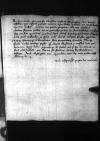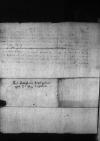Letter #596
A parish priest of St. Michael's Church in Ghent to Ioannes DANTISCUSGhent (Gandavum), 1532-02-23
English register:
The wife of the Bailiff [Arendt Strum] asked the parish priest of St. Michael’s in Ghent to inform Dantiscus that Livina will soon give birth. To conceal the matter from her elderly parents she is staying with another family until the delivery. She asks Dantiscus to send her some more money. The wife of the Bailiff has kindly assisted her with advice. If Dantiscus should return to Ghent, he can count again on a hospitable welcome in the house of the Bailiff.
Manuscript sources:
Auxiliary sources:
Prints:
| ||||||||||
Text & apparatus & commentary Plain text Text & commentary Text & apparatus Excerpts concerning Dantiscus' travels
Ad illustrissimum
Ne loquaciorem, quam par sit,
Vale, Illustrissime Vir.
Ex
Tibi obsequiosissimus


 1AAWO, AB, D. 67, f. 252v
1AAWO, AB, D. 67, f. 252v